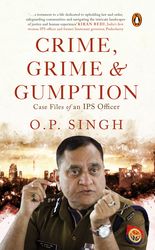Temperatures (and tempers) are going to rise this summer in the north, as it will soon be soaked in the dust and heat of electioneering. As Uttar Pradesh, the most powerful state electorally, prepares for the 2024 Lok Sabha polls, it will be yet another test for police officers who will be fighting crime and more to pave way for a smooth election of the political executive. The very same executive that makes the police “subordinate”, but not “subservient”, points out O.P Singh in his memoir. Singh oversaw the smooth conduct of the 2019 Lok Sabha elections as chief of Uttar Pradesh Police―the country’s largest police force―till he hung up his boots in January 2020.
“If the management of law and order during Kumbh Mela of 2019 was not enough of a responsibility, the Lok Sabha election in the months of April and May further stretched the capacity of the UP police,” Singh writes in Crime, Grime and Gumption. The book is more than a memoir, as it delves into the case files of an IPS officer who fights the “chakravyuh” or trap of caste, underworld and politics to earn the trust of the political executive in a way that he could roll out measures for strengthening the state’s policing system.
Singh spent 37 years in service, commanding three police organisations, but the time spent in his “karmabhoomi” in Uttar Pradesh, he says, took him on a journey like no other. His early khaki days saw him sailing through the “tsunami years” of the Bahujan Samaj Party-Samajwadi Party coalition government. Apart from ensuring law and order during the Kumbh Mela, one of the biggest gatherings in the world, Singh came up with a proactive policing strategy during the Supreme Court’s Ayodhya temple verdict, which came close on the heels of the revocation of Article 370 in Jammu and Kashmir. He also established the long-awaited police commissionerate system in Uttar Pradesh under the Yogi Adityanath government. Each of these events was a challenge, writes Singh.
Ahead of the Ayodhya verdict, Singh recalls getting a call from the office of then chief justice of India Ranjan Gogoi. “This was an unprecedented move, never before had the court directed UP DGP for such a briefing,” he writes.
Singh was born in the serene town of Gaya, where his father Sheo Dhari Singh was popularly known as “barrister saab” for his qualifications from the prestigious Middle Temple, one of the four Inns of Court in London. He, however, lost his father when he was 14. He left the hamlet of Mira Bigha, and moved to Delhi for higher studies. He prepared for the civil services and finally entered the Uttar Pradesh cadre, where, like a senior police officer had told him, he had his “baptism by fire”. He was Lucknow’s senior superintendent of police during the SP-BSP regime. BSP’s Kanshi Ram and Mayawati demanded his resignation over the killing of Mahendra Fauji, a terror in western Uttar Pradesh, but Samajwadi’s Mulayam Singh Yadav refused them. But he eventually had to budge. Barely had he spent 37 days in office when Singh was called to Yadav’s residence. “You are not being suspended, but being transferred,” said Yadav, not meeting Singh’s eyes. Singh had never seen a powerful leader in such a hapless state. “I felt flattered and bemused at the same time to become a potential reason for the fall of a government,” he writes.
Before Singh’s tenure ended, the Yogi Adityanath government announced the commissionerate system in Lucknow and Noida. “I used the chief minister’s trust for wresting benefits for the UP police, system building and strengthening the institution of the DGP,” he writes.
Singh’s accounts and personal experiences make the book a must-read for police officers and aspiring civil servants, even as it enthrals readers with his evocative writing.
CRIME, GRIME AND GUMPTION: CASE FILES OF AN IPS OFFICER
Author: O.P. Singh
Publisher: Penguin Random House India
Price: Rs499; pages: 256


